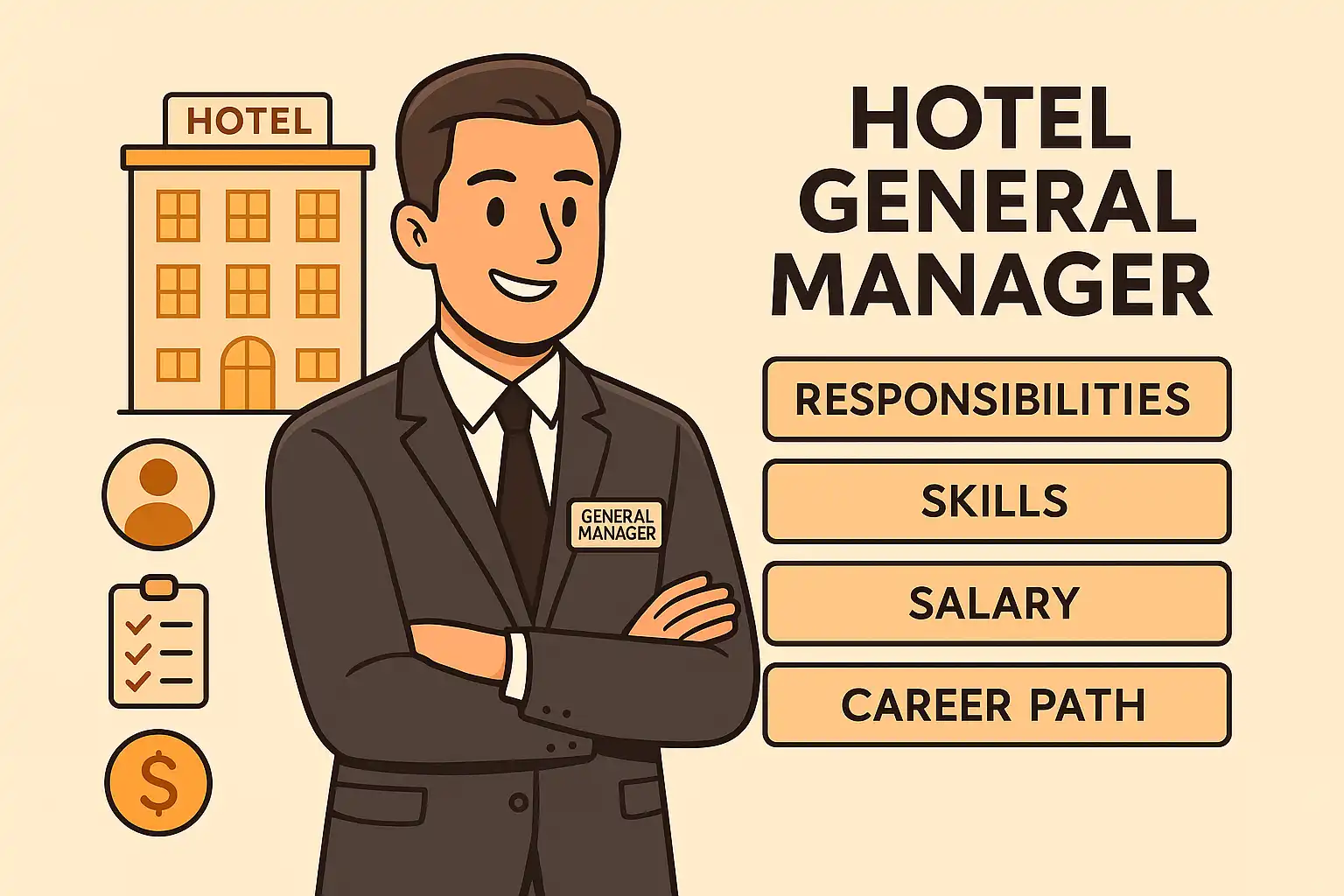Hotel General Manager: Responsibilities, Skills, Salary & Career Path
 Mika Takahashi
Mika Takahashi Mika Takahashi
Mika TakahashiThe hospitality industry is booming like never before, with over 6,500 new hotels set to open by 2025. At the center of every thriving hotel is the hotel general manager — the executive leader who turns guest expectations into memorable experiences while keeping the business running smoothly and profitably.
Hotel general managers are the backbone of hotel operations. They juggle multiple departments daily, making sure guests are happy and the hotel’s financial health stays strong. Whether you’re thinking about stepping into hotel management or climbing the ladder from your current hospitality role, knowing what this job entails is key to success.
This all-in-one guide will walk you through everything you need to know about becoming a successful hotel general manager — from the main responsibilities and must-have skills to education requirements, salary expectations, and what the future holds in this fast-paced industry. We’ll also dive into the career paths and professional development that can help you rise to the top in hospitality management.

A hotel general manager is the top executive responsible for running every aspect of a hotel — from the front desk and housekeeping to food and beverage and maintenance. They’re the highest-ranking person on-site, making big decisions that impact both the guest experience and the hotel’s bottom line.
General managers oversee daily operations across every department — rooms, food and beverage, spa, housekeeping, maintenance, and more. They stay hands-on, knowing the ins and outs of everything from guest check-in to maintenance schedules.
Daily property inspections are part of their routine to ensure the hotel meets brand standards and safety regulations. They check guest rooms, public spaces, back-of-house areas, and safety equipment to keep quality consistent and nip any issues in the bud before they affect guests.
They lead daily management meetings with department heads to tackle operational challenges and review performance metrics. These meetings help align priorities, plan for busy times, and make sure resources are allocated where they’re needed most.
Implementing standard operating procedures and quality control measures is key to delivering consistent service. This includes staff training, setting performance benchmarks, and monitoring service quality at every guest touchpoint.
Managing the hotel’s online reputation is also a big part of the job. General managers spend time each week responding to online reviews, monitoring guest feedback, and ensuring the property management system integrates smoothly with distribution channels to keep the hotel’s online presence strong.
Managing the hotel's finances is a major responsibility. General managers handle annual budgets that can range from $2 million to $50 million, depending on the hotel’s size and market.
They keep a close eye on key performance indicators like RevPAR (Revenue per Available Room), ADR (Average Daily Rate), and hotel GOP (Gross Operating Profit). These numbers give real-time insights into how the hotel is doing and help guide decisions about pricing, staffing, and operations.
Analyzing profit and loss statements, cash flow, and departmental budgets helps them spot opportunities to save money — whether it’s renegotiating contracts, optimizing staffing, or improving operational efficiency without sacrificing service.
Working closely with revenue managers, they fine-tune pricing strategies and manage inventory across distribution channels. This teamwork ensures the hotel maximizes revenue during busy seasons and maintains steady occupancy when things slow down.
General managers also present financial reports to owners or corporate management regularly, explaining budget variances, suggesting corrective actions, and showing how operational changes affect financial results.

Recruiting, hiring, and training department heads and key management staff falls on the general manager’s shoulders. They craft job descriptions, conduct interviews, and make sure new hires fit the hotel’s culture and service standards, while also following legal hiring practices.
They design employee training programs aimed at reducing the high turnover rates common in hospitality — which average around 75% annually. These programs focus on technical skills and exceptional customer service, helping staff grow their careers while boosting guest satisfaction and efficiency.
Performance evaluations and career development plans help motivate and retain management team members. These reviews recognize top performers, address issues, and lay out clear paths for advancement within the hotel or the wider hospitality industry.
Creating a positive work environment is essential to improving employee satisfaction and cutting recruitment costs. General managers foster this by offering recognition programs, training opportunities, and open communication channels where staff can share feedback and ideas.
Managing training across departments means understanding the unique skills needed for roles ranging from front office manager to food and beverage services coordinator. They also promote cross-training to increase operational flexibility and teamwork.
Keeping guests happy is at the heart of the general manager’s role. They monitor guest satisfaction scores on platforms like TripAdvisor, Booking.com, and Google Reviews, aiming to keep ratings above 4.0 stars.
When guest complaints escalate beyond department heads, the general manager steps in to resolve issues with exceptional customer service and problem-solving skills, often authorizing solutions that restore guest confidence and loyalty.
They set up guest feedback systems and use suggestions to improve services and amenities — whether that means upgrading rooms, tweaking food and beverage options, or enhancing common areas.
Developing VIP programs and personalized services for repeat and high-value guests helps build loyalty. These perks might include room upgrades, special amenities, or exclusive recognition that encourages repeat visits and positive word-of-mouth.
General managers also ensure the hotel consistently meets brand standards in guest-facing areas and service protocols through regular audits, staff training, and ongoing monitoring, all aimed at delivering exceptional guest experiences that drive repeat business and boost the hotel’s reputation.
Leading teams of 50 to 500+ employees across multiple departments and shifts requires strong leadership skills. General managers motivate diverse teams, resolve conflicts, and maintain consistent service standards around the clock.
Excellent verbal and written communication skills help them interact effectively with guests, staff, owners, and corporate stakeholders. They build relationships, solve problems, and professionally represent the hotel across cultures and languages in today’s global hospitality market.
Conflict resolution is a daily necessity, whether dealing with employee disputes, guest complaints, or vendor negotiations. Successful general managers find creative, win-win solutions that uphold brand standards and legal requirements.
Multilingual abilities are a bonus, especially in international markets with diverse guests. Cultural competency helps managers connect with guests and staff from all backgrounds.
Public speaking skills come in handy for community events, industry conferences, and staff meetings, helping general managers build networks, partnerships, and career opportunities.
Financial savvy is crucial. General managers need expertise in budgeting, cost control, and revenue management to keep the hotel profitable without compromising service quality. They understand hospitality accounting, cash flow, and how to analyze data to make smart business decisions.
They’re also tech-savvy, familiar with hotel technology like PMS (Property Management Systems), CRM software, and revenue management tools that boost operational efficiency and guest satisfaction.
Marketing know-how is important too. General managers understand digital marketing, social media, brand promotion, and online distribution channels — all essential for attracting guests and managing the hotel’s online reputation.
They keep up with labor laws, safety regulations, and compliance requirements to protect the hotel and ensure a safe environment for guests and staff.
Strategic planning skills enable them to set long-term goals, analyze market trends, and position the hotel competitively in a constantly changing landscape.
Crisis management is part of the job — handling emergencies, natural disasters, or unexpected disruptions quickly and calmly to protect guests and staff.
They make fast decisions during busy periods, special events, or high-occupancy days to keep operations running smoothly.
Analytical thinking helps them interpret performance data, guest feedback, and market trends to spot improvement opportunities and make informed choices.
Being adaptable is key in a fast-evolving hospitality landscape, embracing new technologies, changing guest expectations, and industry regulations.
A detail-oriented approach ensures quality control and safety compliance across all departments, maintaining high standards that guests expect.

Most hotels prefer candidates with a bachelor’s degree in hospitality management, business administration, or a related field. These programs cover hotel operations, financial management, marketing, and human resources with a hospitality focus.
A master’s degree like an MHA or MBA can boost starting salaries and provide advanced leadership and business skills, often including internships and specialized coursework.
Top hospitality schools like Cornell, UNLV, and FIU offer excellent industry-specific training and networking opportunities.
Some general managers rise through the ranks with associate degrees combined with extensive experience and professional development.
Continuing education through industry associations like AHLA helps managers stay current on trends and best practices.
Starting in entry-level roles such as front desk agent or housekeeping supervisor gives foundational experience in guest service and hotel operations.
Mid-level management roles like front office manager or food and beverage manager require 3-5 years of experience and develop leadership skills.
Senior management positions such as assistant general manager or director of sales prepare candidates for general manager responsibilities, involving strategic planning and financial oversight.
Becoming a general manager typically takes 8-12 years of progressive experience across multiple hotel departments.
Cross-training in areas like front office, housekeeping, and food and beverage is essential for a well-rounded understanding of hotel operations.
Certifications like the Certified Hotel Administrator (CHA) demonstrate comprehensive knowledge in hotel operations and management.
The Certified Hospitality Supervisor (CHS) helps develop foundational management skills.
Certified Revenue Management Executive (CRME) shows expertise in financial management and revenue optimization.
Certified Hospitality Technology Professional (CHTP) highlights competency in hotel technology systems.
Food safety certifications like ServSafe are essential for managers overseeing food and beverage operations.
Salaries vary widely based on hotel size, location, and market segment, typically ranging from $65,000 to $150,000 annually.
Luxury hotels and resorts often pay $120,000 to $250,000 plus bonuses, reflecting the complexity and high guest expectations.
Limited-service hotels offer $45,000 to $80,000, providing great entry points for gaining management experience.
Big cities like New York, San Francisco, and Miami offer salary premiums due to higher living costs and competition.
Additional benefits often include health coverage, retirement plans, hotel discounts, and performance incentives.
Some management companies provide housing allowances or on-property accommodations, especially for resort or international roles.
| Hotel Type | Salary Range | Typical Bonuses | Additional Benefits |
|---|---|---|---|
| Limited Service | $45,000 - $80,000 | 10-15% | Health benefits, hotel discounts |
| Full Service | $65,000 - $150,000 | 15-25% | Health benefits, retirement, training |
| Luxury/Resort | $120,000 - $250,000 | 20-30% | Comprehensive benefits, housing allowance |
The Bureau of Labor Statistics expects lodging manager jobs to grow 8% from 2022 to 2032 — faster than average — thanks to rising travel demand and hotel expansion.
With thousands of new hotels opening, there’s a strong need for experienced general managers in all market segments.
Career paths include regional manager, area director, or corporate executive roles for those who excel in leadership and business results.
International opportunities abound with global hotel brands operating in over 100 countries, offering cultural experiences and career growth.
Entrepreneurial options include hotel ownership, consulting, or franchise development for seasoned managers.
As baby boomers retire, leadership vacancies open up, providing advancement chances for qualified candidates.
The hospitality landscape is also evolving with trends like sustainable tourism, technology integration, and experiential travel — areas where savvy general managers can lead the way.
Success as a hotel general manager takes dedication to learning, strong leadership, and a passion for delivering outstanding guest experiences while maintaining financial health. Combining business smarts with people skills and operational know-how makes this role both challenging and rewarding.
Whether you’re just starting out or aiming for the general manager chair, focus on gaining broad operational knowledge, sharpening leadership skills, and building experience across hotel departments. Investing in education and professional growth will set you up for a fulfilling and dynamic career in hospitality management.